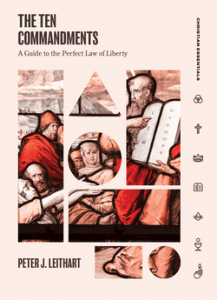Honor your father and your mother, that your days may be long in the land that the Lord your God is giving you. —Exodus 20:12
Peter Leithart, a prolific author and president of the Theopolis Institute, has written an excellent and concise treatment of the Ten Commandments, showing how they are, as the subtitle puts it, “a guide to the perfect law of liberty.” He unpacks their importance and relevance for Christians today as well as their connection to Jesus Christ, “the heart and soul of the Decalogue” (6). There is much to commend with this little book and the series of which it is a part, but his discussion of the fifth commandment and how we honor our father and mother was particularly insightful.
Ten Words: A Pattern of 5 + 5
One of the unique contributions that Leithart makes in his reflection on the Ten Commandments is a rather compelling argument for dividing the Ten Words into a 5 + 5 pattern, the first five concerning love for God and the second half love for neighbor. Leithart notes that each of the first five commands names Yahweh and gives a rationale, warning, or a promise for keeping them (cf. Ex. 20:2-12). This suggests that the Fifth Commandment to honor your father and your mother (Ex. 20:12), belongs to the group of commands that focus on our love for God.
Grouping the fifth commandment with the first four is not only for grammatical or stylistic reasons, however. Leithart observes that, “The Hebrew word for ‘honor’ means ‘glorify,’ which Scripture uses to speak of honoring God. Your parents aren’t God, but they’re God’s gifts to you, as you are God’s gifts to them. They way you treat them should resemble the way you respond to God” (The Ten Commandments, 68). In his article on the structure of the Ten Commandments, David Baker agrees with Leithart’s 5+5 pattern, adding that honoring one’s parents is a fundamental virtue which seems to follow the commands to honor God, his Name, and his Day.
How Do We Honor God?
When this command is understood as one of the five connected to love for God, it helps us see that honoring one’s father and mother is more than simply doing what they say. By considering the way we give glory to our heavenly Father, we see more clearly what keeping the fifth commandment actually entails. The practical significance of this command, Leithart explains, is filled out by asking the question: How do we honor God?
- By praising him. Leithart asks, “Do you speak well of your parents, or do you criticize, grumble, and pretend you know better” (68)? Do we thank our parents for providing for us, teaching us, putting up with us? Or do we harbor bitterness toward them, only remembering and proclaiming their mistakes and failures?
- By serving him. Yes, to honor means to obey. But do we adopt a posture of joyful service and obedience toward our heavenly Father, who is our our Maker and Lord? Do we serve Him with honor or begrudgingly (cf. Lev 19:32)?
- By listening to him. Leithart explains, “The Hebrew word ‘glorify’ comes from the word ‘weight.’ To honor parents is to give weight to their opinions, presence, and advice…Children honor them when they acknowledge their parents have wisdom they lack, when they allow themselves to be led in the way that leads to life” (68). While far from being omniscient and infallible, our parents can help us avoid unnecessary heartache and sin if we will only humble ourselves and admit our need for wisdom
- By trusting him. God doesn’t always give us an explanation up front that we deem sufficient, but we know that he loves us and that he is good, and that is enough. “We trust God to provide for us, to do good and have our best interests in view. Children honor their parents by assuming that their rules and curfews and chores are intended to bless them, even if they can’t see how” (69).
- By submitting to discipline. “God proves our sonship by disciplining us (Heb 12). When we resist God’s discipline, we’re not honoring him. When children fume resentfully about correction they’re disobeying the Fifth Word” (69).
Honoring Father and Mother For Life
But what about adult children? It’s often easy to restrict the audience of this command to children under 18 that are still living at home. But this command was given, along with the other nine, to the entire nation of Israel. Honoring our father and mother is for life, not just for a season. Yes, this command is obeyed differently at different stages in our lives, but as Leithart reminds us, “The Fifth Word is never superseded. Adult children must honor their parents—praise them, give weight to their words, trust them” (69). Practically, this also means we honor our parents by caring for them in their old age.
While fallible, failure-prone, and far from perfect, our parents are nevertheless a gift from God to us. When we frame the fifth commandment in terms of honoring God we are able to understand the seriousness of this command as well as more clearly see the many, life-long ways we are called to keep it. As we seek to obey God and his word, following the example of our Lord and Savior, Jesus Christ, may the honor we show our father and mother be far from a mere obedience that is carried out resentfully, contemptuously, or temporarily. Rather, may it be filled with loving praise, humble service, joyful trust, and life-long respect.





